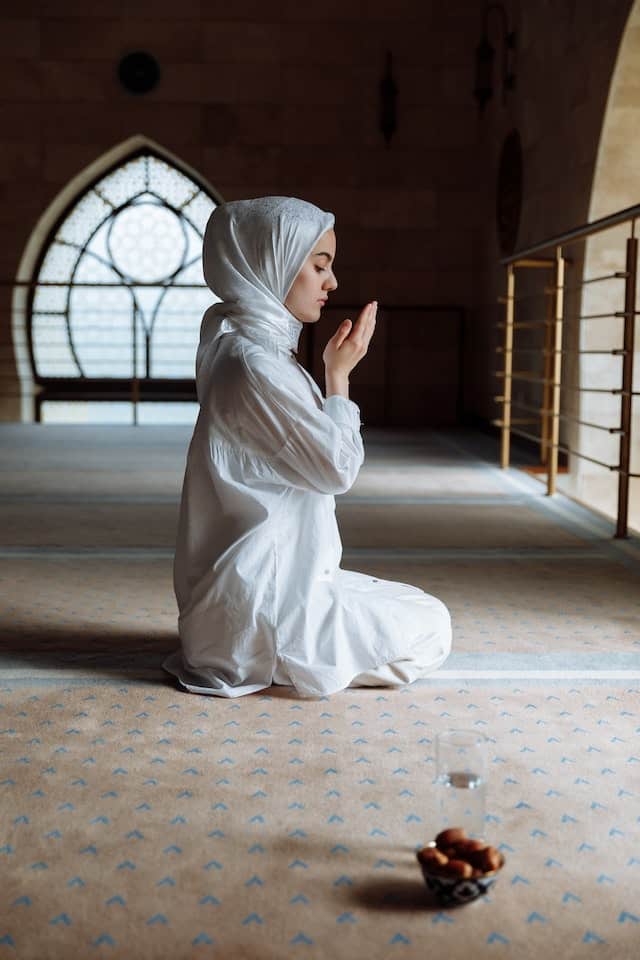How long is the minimum for ei’tikaf? Can women do ei’tikaf at home?

One of the special features of Ramadan is ei’tikaf, which is going into seclusion to worship Allah Almighty.
It is the sunnah to go into seclusion in the last ten days of Ramadan, as the Prophet (peace be on him) used to do and his wives continued do ei’tikaf in the mosque and continued this practice in the mosque after he passed away (peace be upon him).
Where can one be in ei’tikaf?
Men can only perform ei’tikaf in the mosque. The majority opinion is that women have to do ei’tikaf in the mosque but the Hanafi opinion is that women can also go into ei’tikaf in a room in their home, where they can be undisturbed.
What does on do in ei’tikaf?
It is a time to shut down all distractions and focus fully on Allah Almighty. During ei’tikaf one can recite Quran, make dhikr, recite darood, reflect and repent. Men perform their salah in congregation.
How long does one need to stay in ei’tikaf?
Ei’tikaf, in Arabic, means ‘staying’, and can mean a long period of time or a short one, there is no set duration and so it can be short, with the intention of being in isolation with the intention of solely dedicating your time to the worship of Allah.
Some scholars are of the opinion that the minimum length of ei’tikaf is one night which was the view of Abu Hanifah and was some Malikis. However that Ya’la ibn Umayyah (may Allah be pleased with him) said:
I will stay in the mosque for an hour, and I am only staying to observe ei’tikaf. [Ibn Abi Shaybah]
“Hour” here refers to a period of time but it does not mean an hour in the modern sense of sixty minutes.
How do you prepare for ei’tikaf?
The Prophet (peace be on him) used to do ghusl (take a bath) before laylatul-qadr, preparing for the very special meeting with Allah Almighty during the night prayers, and conversing with Allah Almighty by reciting His book.
Prophetic ei’tikaf
The Prophet (peace be upon him) would seclude himself on the last 10 nights seeking laylatul-qadr. Aisha (may Allah be pleased with her) would erect a tent made from reed mats and bamboos for him. The Prophet (peace be on him) would remain in ei’tikaf until Eid.
Aisha (may Allah be pleased with her) narrated:
‘With the start of the last ten days of Ramadan, the Messenger of Allah (peace be on him) used to tighten his belt and used to stay up all night, and he would also wake his family.’ (Bukhari)
The Prophet (peace be on him) would tighten his belt means that he stayed away from his home and his wives, as he was in e‘itikaf in the mosque.
During these ten days he would stay awake almost all night in worship.
Whoever stands in night prayers in laylatul-qadr out of iman of Allah Almighty and seeking reward from Allah will have his former sins forgiven. (Bukhari and Muslim)
The reward of ei’tikaf and laylatul-qadr are enormous. According to authentic hadith the doors of supplication are open that night.
Abu Hurairah (may Allah be pleased with him) reported:
The Messenger of Allah (ﷺ) used to urge (the people) to perform (optional Tarawih) prayer at night during the month of Ramadan. He did not order them or make it obligatory on them. He (ﷺ) said, “Whosoever stands up in night prayers during the month of Ramadan, with faith and in the hope of receiving Allah’s reward, will have his past sins forgiven.” [Muslim]
Whosoever performs e’tikaf with faith and in the hope of receiving Allah’s reward, will have his past sins forgiven.” [Daylami]
Can a woman on her period go into ei’tikaf?
If a woman is doing ei’tikaf in the mosque she cannot do this while she is on her period. If she is in the mosque and her period starts she would have to end her ei’tikaf.
If a woman is doing ei’tikaf at home the same restriction does not apply. She can do dhikr and recite the Quran and make dua.
- The truth is more powerful than lies
- Does a bride’s wali have to be Muslim?
- Is is permissible to lead a salah split over different rooms?
- Global IT outage. When systems go down…
- The concept of worship. What are ibadah and ihsan – and how do they lead to self development?
Recommended Posts

Does a bride’s wali have to be Muslim?
July 25, 2024

Can I remove my hijab for a scan?
June 26, 2024

